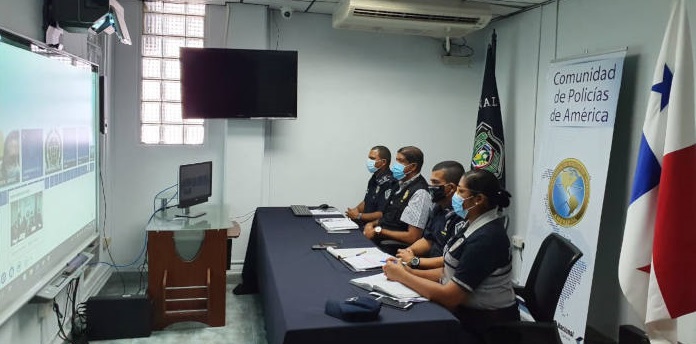In times of crisis, insecurity or chaos, many cybercriminals take advantage of the vulnerable situation to spread and make a wide variety of hoaxes and frauds go viral with the aim of misinforming, deceiving or infecting citizens with various objectives.
Likewise, the current context of isolation of the population to stop COVID-19 has triggered the private and professional use of new technologies, increasing the risk of cyber attacks (phishing/malware).
The EL PAcCTO project:Support for AMERIPOL, financed by the European Union, and managed by the FIIAPP, in its desire to offer significant support to the region in this situation, has proposed the holding of video conferences channelled through the Executive Secretariat and the National Units of AMERIPOL (UNAs) to disseminate and promote good practices, and lessons learned from the European Union. This time, the organisation of a video conference focused on the field of disinformation and cybercrime.
Disinformation during the health crisis
The video conference was opened by Mr. Ignacio Ybáñez, Ambassador of the European Union in Brazil, Mrs. Veronique Lorenzo, Latin American Head of Division in the European External Action Service and Mr. Adriano Barbosa, AMERIPOL Executive Secretary delegate, representing Mauricio Valeixo, Director of the Brazilian Federal Police, who, though present in the video conference, had some connection problems.
Different institutions were also present. From Spain, the participation of specialists, specifically from the General Information Commissariat, who discussed the importance of controlling fake news and of darknet, was managed through the International Cooperation Division (DCI) of the National Police, and from the Technological Investigation Unit (ITU) of the General Commissariat of the Judicial Police, who focused on preventive actions and cyber-patrols through the network.
The head of the EUROPOL cybercrime centre, the European External Action Service, and an intelligence company based on the application of artificial intelligence, CEO of Alto Analytics, also took part.
800 participants in the video conference
The video conference exchanged data such as the fact that there are currently more than 120,000 registered web domains related to COVID-19 on the surface web (traditional internet), which is an increase from the 12,000 that were detected on 25 March. On the other hand, the high demand for certain goods such as protection and cleaning material leads to scams and the sale of copied or low-quality products.
Likewise, the rise of child sexual exploitation during the period of confinement is noted, with a greater traffic of pornographic images of minors, or the detection in forums of conversations explaining how to get such images from minors.
More than 800 participants, including 82 police units, attended the video conference. Regarding the success of the call, the project leader and chief police inspector, Marcos Alvar, pointed out that “this time of global crisis in which all countries are vulnerable, is when international cooperation and solidarity must show themselves to be equal to the task”.
The objective of the video conference was to enable the detection of disinformation campaigns aimed at eroding social and political stability, as well as to anticipate new forms of cybercrime, such as attacks on main infrastructures (ministries of health, logistics infrastructure, banking) and scams against individuals that use COVID-19 as a hook to defraud and steal personal and bank data.
